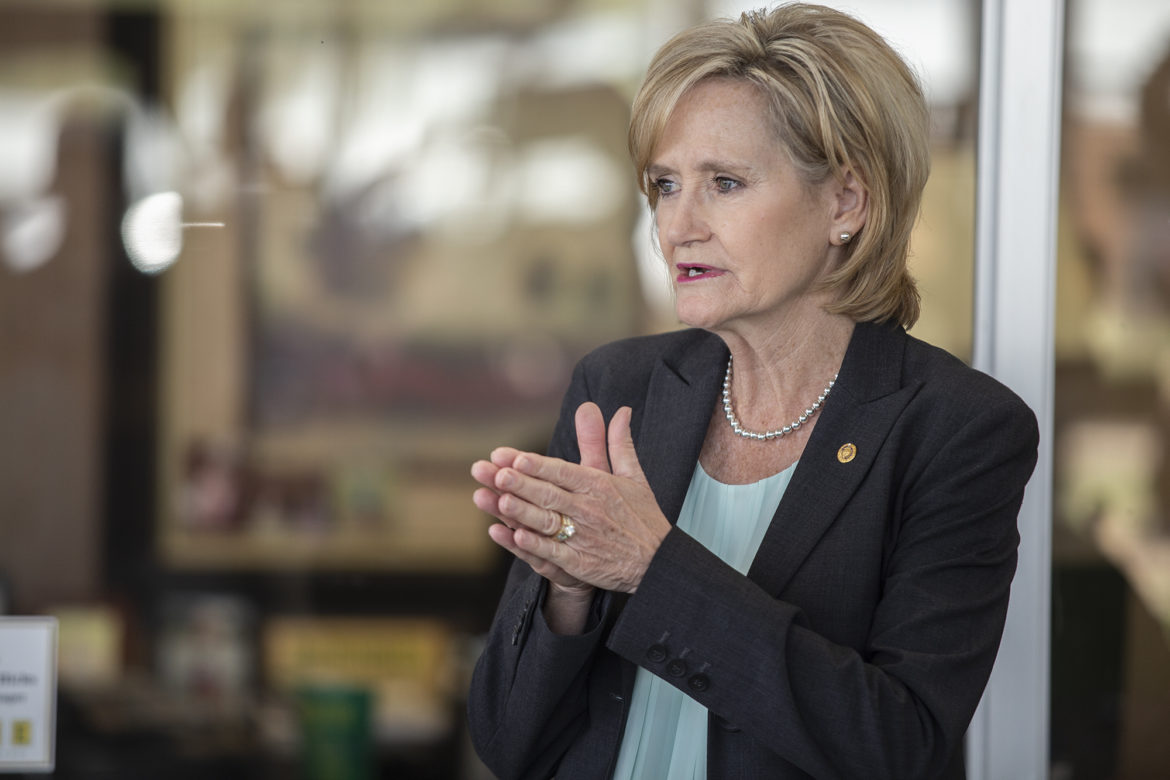Twelve Senate Democrats did not vote for a resolution Thursday honoring U.S. Sen. Cindy Hyde-Smith as being the first woman elected to represent Mississippi in Washington because she is blocking a vote on the nomination of Scott Colom to a federal judgeship.
“As Democrats we support women being elected to political office,” said Sen. Derrick Simmons, D-Greenville, who is the chamber’s minority leader. But Simmons said the decision not to vote on Hyde-Smith’s resolution was to bring attention to her refusal to allow the U.S. Senate to vote on Colom’s nomination by President Joe Biden to serve as a federal judge in the Northern District of Mississippi.
Because of a sometimes-honored U.S. Senate tradition, senators from the home state of a nominee for the U.S. district court can block a vote on the nominee by refusing to return a so-called “blue slip.” Colom’s nomination has bipartisan support from Roger Wicker, Mississippi’s senior U.S. senator, and also from former Republican governors Haley Barbour and Phil Bryant.
“Democrats are concerned with Cindy Hyde-Smith holding up the nomination of Scott Colom,” Simmons said. “No Democrat opposes the worth of the resolution honoring her. But we do feel that it is important that the federal posts in Mississippi that deal with law and order be filled. We support Scott Colom’s nomination just like a broad range of people.”
No member of the state Senate voted against the resolution that now goes to the House. But 11 of the 16 Senate Democrats did not vote. A 12th, Brandon Blackmon of Canton, voted present. The resolution actually was voted on twice due to procedural issues. The first time Blackmon voted for it. Four other Democrats voted for the resolution both times it was offered.
In the past, Hyde-Smith has said she is blocking the nomination of Colom, the first African American elected as district attorney for the 16th District in north Mississippi, because he opposed legislation banning trans women from competing in women’s sports.
While Colom has voiced general support for trans rights, he has never publicly commented on the issue of trans women competing in women sports.
Hyde-Smith also said she opposed Colom because a political action committee funded at least in part by billionaire George Soros spent funds on his first election to the office of district attorney in 2015. Soros, a New York billionaire, has supported criminal justice reform and other issues such as governmental transparency. Colom has said he did not know the PAC had received campaign contributions from Soros until it was reported in the media.
READ MORE: U.S. Senate chairman ‘extremely disappointed’ by Hyde-Smith’s effort to block judicial nomination
The blue slip process that Hyde-Smith is using to block a vote on Colom’s nomination began as a method to preserve segregation and racial discrimination in the South.
Starting in the 1950s, U.S. Sen. James Eastland of Mississippi was the first Senate Judiciary Committee chair to use the process to allow a single home-state senator to block a presidential nominee to the federal bench. Eastland used the process to block federal judges from being appointed in Southern states sympathetic to school desegregation, according to multiple accounts detailed in news stories and scholarly research articles.
In 2017, during his time as Senate Judiciary chair, conservative Sen. Chuck Grassley, a Republican from Iowa, wrote: “For the vast majority of the blue slip’s history, a negative or unreturned blue slip did not stop the Senate Judiciary Committee from holding a hearing and vote on a nominee. In fact, of my 18 predecessors as chairman of the committee, only two allowed home-state senators unilateral veto power through the blue slip. The first to do so, Sen. James Eastland (D-Miss.), reportedly adopted this policy to thwart school integration after the Supreme Court’s decision in Brown v. Board of Education.”
Hyde-Smith previously served in the Mississippi Senate before being elected to the statewide post of commissioner of agriculture and commerce. In 2018, Bryant appointed her to the U.S. Senate to replace Thad Cochran, who opted to retire. She has since been elected to the U.S. Senate twice.

